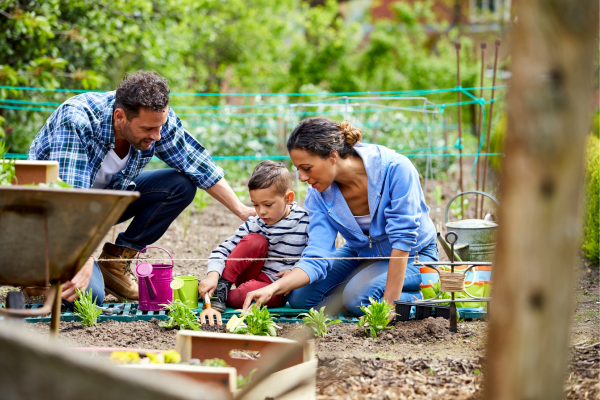Your cart is currently empty!

28 Aug The Therapeutic Aspect of Gardening: Cultivating Mindfulness
In today’s fast-paced and digitally driven world, finding moments of calm and relaxation can be challenging, especially for young adults. The pressures of work, studies, and social obligations often leave little room for self-care and reflection. However, amidst the chaos, there is a sanctuary waiting to be discovered- the therapeutic aspect of gardening.
Beyond its aesthetic appeal and environmental benefits, gardening has a profound therapeutic aspect that can help cultivate mindfulness, reduce anxiety, and provide a much-needed respite from the stresses of modern life.
Gardening as a mindful and meditative practice offers young adults an opportunity to reconnect with nature and themselves. By nurturing plants, one becomes fully present in the moment, focusing on the task at hand and immersing themselves in the sensory experiences. Whether it’s feeling the earth beneath their fingertips, listening to the rustling leaves, or witnessing the subtle growth of a seedling, gardening demands our attention and encourages us to slow down, breathe deeply, and appreciate the beauty of the natural world.
The act of gardening itself can be therapeutic, akin to a moving meditation. As young adults engage in tasks such as planting, weeding, or pruning, they can enter a state of flow—a state of complete absorption and concentration. In this state, worries and anxieties fade into the background as the mind becomes fully engaged in the present moment. The rhythmic nature of gardening tasks, coupled with the peaceful ambience of the outdoors, creates an environment conducive to relaxation and introspection. The repetitive motions of tending to plants can calm the mind, allowing stress to melt away and making space for clarity and inner peace.
To create a calming atmosphere in the garden, certain design elements can be incorporated such as:
- The choice of plants, colours, and textures: It can greatly influence the overall mood and ambience of the space. For a tranquil environment, consider using a soft colour palette with shades of blues, purples, and greens. These colours have a soothing effect on the mind and can help induce a sense of calmness. These plants not only add beauty but also release pleasant fragrances that can promote relaxation and reduce stress.
- Incorporating a variety of textures: Various textures such as smooth leaves, feathery fronds, or velvety petals, can add visual interest and tactile experiences that engage the senses. Smooth leaves, like those found on peace lilies, offer a gentle touch. Feathery fronds of ornamental grasses sway gracefully in the breeze, providing a sense of movement. Flowers with velvety petals, such as roses or pansies, invite touch and create a tactile experience.
- Sound of Water: Introducing elements of water into the garden can enhance its therapeutic qualities. The sound of trickling water from a fountain or the gentle flow of a stream can create a sense of serenity and help mask urban noise. Water features also serve as a focal point for meditation and reflection. A small pond or a contemplative pool with water lilies can provide a space for self-reflection and encourage moments of quiet contemplation.
- Separate Space to Relax: In addition to sensory elements, consider incorporating spaces for quiet contemplation and relaxation. A secluded seating area nestled among plants, shaded by a tree or a pergola, can provide a peaceful retreat within the garden. Adding comfortable outdoor furniture or even a hammock allows young adults to unwind and immerse themselves in the beauty of their surroundings. Including scented plants, such as lavender or jasmine, can further enhance the relaxing atmosphere and stimulate the olfactory senses, promoting a sense of calm and tranquillity.
Furthermore, gardening can also be a social activity that fosters connections and builds a sense of community. Young adults can engage in communal gardening projects, join gardening clubs, or participate in local initiatives. By working together with others, they can share their knowledge, experiences, and even harvests. These collaborative efforts deepen their connection with nature and provide a support system and a sense of belonging.
Gardening offers young adults a therapeutic and mindful practice that can alleviate anxiety, reduce stress, and promote relaxation. By immersing themselves in the process of nurturing plants, they can experience the benefits of being fully present in the moment and reconnecting with nature. Creating a calming garden design with soothing colours, textures, and elements of water can further enhance the therapeutic aspect of gardening.
As we have explored the therapeutic aspect of gardening and its potential to cultivate mindfulness and reduce anxiety, it is time to take action and embark on your own gardening journey. If you are inspired to create a tranquil and calming garden space that promotes relaxation and self-reflection, we encourage you to visit the Environmental Factor website.
At the Environmental Factor, you will find a wide range of gardening products carefully selected to support sustainable practices and enhance your gardening experience


